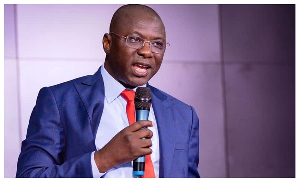A strong corporate governance culture, especially among state-owned enterprises (SOEs), will prove crucial in safeguarding the nation’s economic stability and ensuring it does not regress into unsustainable debt levels.
This message was forcefully delivered by a number of key stakeholders, spearheaded by Minister of Finance Dr. Mohammed Amin Adam, at the first-ever Boardroom Summit held at Labadi Beach Hotel on October 8, 2024, themed ‘Director, accountability, governance and sustainable development’.
The event brought together key stakeholders to discuss, among other things, the future of state-owned enterprises (SOEs) and private sector governance.
“Undoubtedly, good governance is, first and foremost, a means to improve development outcomes. Indeed, at the macro level, numerous studies show a direct link between well-governed public institutions and better social outcomes,” Dr. Adams stated.
His comments come as the government last week announced that it had secured over 98 percent consent from euro bondholders for the restructuring of their instruments, bringing the curtain down on debt swap efforts which began 22 months ago.
While exchange is expected to be concluded later this week, the minister has already suggested that work is underway to put a cap on future public debt.
“I do not doubt that as our country’s economic prospects continue to gather momentum, we must complement that progress with a ‘good-governance agenda’ across our institutions to drive long-term success,” Dr. Adam stressed.
The minister further highlighted the government’s ongoing efforts to reform SOEs since 2017, particularly the adoption of the corporate governance action plan, which received funding support from the World Bank.
Dr. Adam outlined four key objectives of the reform plan: improving the legal and regulatory framework, strengthening state oversight, professionalising SOE boards, and enhancing transparency and disclosure.
He noted that these reforms have already shown results, with about 20 SOEs holding annual general meetings in 2024.
The Acting Managing Director of the State Interests and Governance Authority (SIGA), John Boadu, underscored the importance of accountability in the boardroom.
“Directors occupy a very important space in the governance architecture; and with the work that they do and are expected to do, I personally think that whether we move forward as a country or not depends on how directors direct,” Mr. Boadu stated.
Taking the argument further, he stated that efficient SOEs would not only unburden the state with contingent liabilities, but would rather generate income for the nation, with about 60 percent of the total assets of government assets, amounting to approximately GH¢800billion in the hands of SOEs.
“Imagine what we can do if we realised just 10 percent of the value of these assets annually,” he remarked.
The SIGA head also highlighted dramatic improvements in SOE reporting, with 145 out of 175 entities now providing both management and audited financial accounts, up from just 18 in 2016.
Minister of Public Enterprises, Joseph Cudjoe, also drew attention to the direct link between boardroom decisions and economic growth.
“Our welfare, our development and everything is directly going to evolve from boardroom decisions.”
Comparing Ghana’s economic output to global corporations, he showed how well-run multinationals, with modest board sizes are able to generate annual revenue which are multiples of many countries.
Mr. Cudjoe argued for the development of larger Ghanaian corporations, stating that there appears to be fear of having large corporations, owing to the potential power they could wield.
“It seems we are afraid of having large and powerful corporations, but we must get over that as they are needed for the economic transformation of the nation,” he said.
On her part, the current President of the Institute of Directors-Ghana (IoD-Gh), Angela Carmen Appiah, stated that directors, especially in state institutions, must understand that their role is not merely for personal gain; it comes with immense responsibility.
She added that there is a growing trend where directors who fail in their duties are being held legally accountable.
“This sends a clear message that negligence or misconduct will no longer be tolerated,” she said.
The Boardroom Summit marks a significant step in Ghana’s ongoing efforts to reform its SOEs and improve corporate governance across both public and private sectors, the convener, Professor Douglas Boateng, explained.
Prof. Boateng, under whose leadership as Board Chair the Minerals Income Investment Fund (MIIF) and the Labadi Beach Hotel have recorded growth, emphasised the importance of boardrooms adopting ethical practices and prioritising the long-term interests of their organisations.
“Good governance is not just about compliance; it is about creating a culture of trust, accountability and sustainability. It is not just about profit, it is about the environment as well,” he noted.
Prof. Boateng, who launched the book Practical Perspectives on Corporate Governance at the event, also stressed the need for increased collaboration between governments, businesses and civil society to address the complex challenges facing Africa.
Watch the latest edition of BizHeadlines below:
Ghana’s leading digital news platform, GhanaWeb, in conjunction with the Korle-Bu Teaching Hospital, is embarking on an aggressive campaign which is geared towards ensuring that parliament passes comprehensive legislation to guide organ harvesting, organ donation, and organ transplantation in the country.
Click here to follow the GhanaWeb Business WhatsApp channel
Business News of Thursday, 10 October 2024
Source: thebftonline.com













